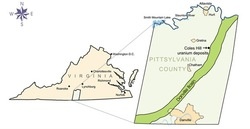Virginia opens door to uranium mining, OKs study

A proposal to mine uranium in south-central Virginia advanced this week when a key state body approved a study of the matter. The targeted site is in Virginia's Pittsylvania County just north of the city of Danville and close to the border with North Carolina's Rockingham and Caswell counties.
A subcommittee of the Virginia Commission on Coal and Energy OK'd the study yesterday after deciding on exactly what issues should be examined, the Richmond Times-Dispatch reports:
Some opponents asked the panel to vote against the study, hoping that would kill the mining proposal.
But state Sen. John Watkins, R-Powhatan, a member of the subcommittee, said approval of the study did not mean approval of mining in Pittsylvania.
"That decision is a long way down the road," Watkins said.
The panel will look at mining's effects on people's health and ecosystems, identify pollution issues and review current mining regulations. But it denied a request by Del. Watkins M. Abbitt Jr. (I-Appomattox) to consider how water pollution specifically might be prevented. The subcommittee's chair, Del. Lee R. Ware Jr. (R-Powhatan) argued that the study already included that issue.
The study, which will be conducted by the U.S. National Research Council, is expected to cost $1.5 million and last about 18 months. It remains unclear how the work will be funded, according to the paper.
As Facing South reported previously, Virginia has banned uranium mining for the past 25 years. Virginia Uranium -- a privately-held company formed several years ago by the owners of the land where the uranium was found -- has been pressing to get the ban lifted. To that end, Virginia Uranium contributed almost $30,000 to state lawmakers last year alone.
The Pittsylvania County site is believed to hold the largest undeveloped uranium deposit in the United States and the seventh-largest in the world. It holds an estimated 60,000 tons -- enough uranium to power all the commercial nuclear plants in the country for about two years. The company estimates its value at about $10 billion.
While the company has maintained that the uranium could be mined safety, uranium mining has a history of causing serious environmental health problems, having been linked to chromosome abnormalities, birth defects and cancer in communities from Texas to Germany.
Uranium mining also poses a serious threat to drinking water. In 1979, for example, a dam holding uranium mining waste at a New Mexico facility owned by the Virginia-based United Nuclear Corp. burst, sending more than 1,100 tons of toxic discards and 90 million gallons of contaminated water into the Rio Puerco. Once an important drinking water source for nearby Navajo communities, the river remains dangerously contaminated today.
Officials in Virginia Beach are among those opposing the uranium mining plans. They have noted that a tropical storm or hurricane could breach the mine's waste impoundment and pollute downstream water bodies including Lake Gaston, the city's drinking-water source.
(Map showing location of proposed uranium mine from Virginia Uranium's website)
Tags
Sue Sturgis
Sue is the former editorial director of Facing South and the Institute for Southern Studies.
